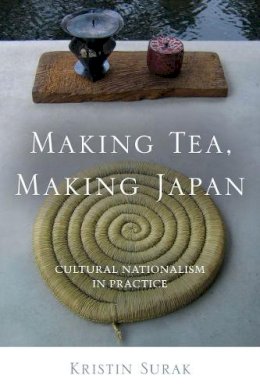Kristin Surak is a Senior Lecturer (Associate Professor) of Japanese Politics at SOAS, University of London. Her work has been published in the European Journal of Sociology, International Migration Review, Ethnic and Racial Studies, and the New Left Review.
"Surak's Making Tea, Making Japan is one of the most astute studies of the ceremony to appear in decades. Beyond tea aficionados, Surak's book should be read by scholars and students of culture and nationalism because Surak's main contribution is showing how these two fields of embodied culture and nationalism are so deeply intermeshed in the practice of tea."—Eric C. Rath, Journal of Japanese Studies "The author gives a wealth of detail on the tea ceremony itself . . . Tea captures the essence of Japanese-ness as well as the virtue of the East Asian mentality. Surak writes in a compelling way about how Japanese intellectuals used tea to emblemize Japan's role as the last repository of East Asian culture, which was at risk of falling prey to the 'White Disaster' . . . [Making Tea, Making the State] offers a useful account of how tea culture permeates Japanese history and contemporary society."—Danielle Kane, American Journal of Sociology "Kristin Surak's elegantly written analysis of the tea ceremony is an excellent addition to the literature on cultural nationalism . . . [T]his book is a meticulous study of tea. Surak resists the temptation of falling into clichés and offers a vibrant analysis of the practice through historical reconstruction, institutional analysis, ethnographic inquiry, and phenomenological description . . . Surak's study is theoretically innovative and essential for sociologists and anthropologists."—Stephanie Assmann, Social History "A regrettable schizophrenia characterizes the study of nationalism, with macro and micro analysts rarely engaging rival views. Hence, Kristin Surak's book is a theoretical breakthrough, showing the changing functions and social bearers of a single ritual over a long and troubled historical record. Elegantly written and extraordinarily argued."—John A. Hall, James McGill Professor of Comparative Historical Sociology, McGill University "Kristin Surak's fine study unpacks the social and historical context of tea and its ceremonial preparation as a highly illustrative case in point of nationalized cultural production and representation. Deftly crossing disciplinary boundaries between anthropology, sociology, and history, Making Tea, Making Japan is a well-crafted and interpretively provocative book that anyone with an interest in Japanese society and the theoretical dynamics of nationalism will find fascinating . . . [B]eautifully written and lucidly argued, the book offers much of value for scholars and students of modern Japan and the cultural manifestations of national identity there and in other parts of the world."—Erik Esselstrom, Histoire sociale / Social History "If you were ever curious about just what makes the tea ceremony such a Japanese thing, then Kristin Surak's book, Making Tea, Making Japan, should answer your questions from all possible angles. . . Surak's passion and love for the topic emanate from the pages. . . This is not a simple guidebook to enchant novices and teach them the basic steps to get started in the Japanese ritual of 'tea'. Surak's comprehensive research will take those interested deep into the practice's background and allow them to see the tea ceremony as a window into the soul of Japanese national identity. "—Metropolis "The book uses historical analysis to show how tea became an important measure of national competence, and ethnographic analysis to show how the processes of differentiation occur. All this is achieved in elegant prose that is a joy to read."—Chris Perkins, H-Net "Surak's greatest strength is her awareness of the factors that inform the tea ceremony's central place in Japanese society, from commercial structures allowing the seamless delivery of the objects and architecture of tea anywhere on the globe, to the casual use of history—not always accurate—deployed in a Sunday lesson. . . Surak's book offers a scholarly story of choreography and commercialization and will find its way into future dissertations and onto the shelves of school libraries."—Dana Buntrock, Cross-Currents: East Asian History and Cultural Review "Making tea for a guest in Japan is a highly encultured act, demanding much more than a pour of hot water over powdered tea. Kristin Surak has plumbed the depths of the practice and demonstrated the enduring meanings of tea for Japanese performers of the craft."—Merry White, Boston University "Kristin Surak's richly contextualized study shows in vivid detail how and why tea came to be, and remains, such a strong carrier of nation in Japan, at once performance and product. Sociologists in particular will not want to miss the fine ethnographic investigation of the tea ceremony in contemporary Japan."—Priscilla Ferguson, Columbia University "Surak's careful ethnography and clear theoretical analysis demonstrate the historical role of the tea ceremony in constructing and defining the nation, but she also shows how it is an important part of the slightly different work of maintaining and explicating Japanese-ness. Through careful ethnographic details she shows how the tea ceremony is embodied in ways both gendered and historically contingent; how it is used to distinguish Japanese from other Asians, Asia from the West, 'good' Japanese from others who are less good; and how it is carried not only in performative bodies but in places/spaces. This often fascinating and lively study of chanoyu draws the reader through these various, and intertwined, processes over Japan's recent historical past, unpacking a rich trove of material artefacts, rituals, and texts."—Sarah Corse, University of Virginia "Kristin Surak's excellent work, Making Tea, Making Japan, provides an eye-opening survey of the history and practice of chanoyu that reveals the tea world's institutional frameworks and patterns of authority, physical and material aspects of its training and practice, and its representation to general audiences."— Nancy Stalker, Monumenta Nipponica

